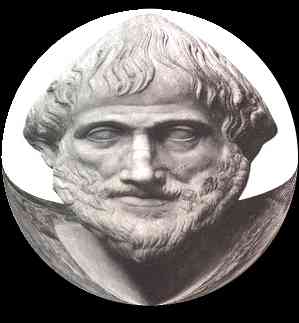|
Aristotle
Aristotle was one of the greatest inspirations to modern day
science. His father was the King of Macedon's physician, which
may have inspired his love of the sciences from a young age. When
he was eighteen, he studied at Plato's Academy in Athens, where
he would stay for just about twenty years.
 Aristotle
Aristotle |
|
After a period of travel, Aristotle later returned to Athens,
where he established his own school, called the Lyceum, and taught
there for twelve years. While at the school, between 335 and 323
BC, Aristotle is thought to have drafted his best works.
Aristotle studied anatomy, astronomy, geography, geology, physics
and zoology.
Because of his establishment of his own school, Aristotle made
big contributions to science education. He changed the way students
learned about different areas of physical science, assigning significant
methods of using theories and equations, and helping students
understand how they were developed.
In terms of the scientific method, Aristotle believed that the
best way to understand nature is through reasoning and observation,
and that knowledge is subject to examination. Aristotle set the
basic standard for the modern scientific method: that all observations
must include the composition, the shape or form, the motion or
change, and the end result/purpose of the examination. He dismissed
the ideas of chance and spontaneity as fact, and didn't consider
them a cause. This method is similar to what is used in most science
experiments in labs today.

Without the work of Aristotle in the area of Physics, scientists
like Galileo, Newton, and Einstein may not have become famous.
A large part of Einstein's Theory of Relativity is founded on
a principle discovered by Aristotle: infinite velocities could
not exist, that time and movement are continuous and inseparable,
and that time was even flowing, infinite, and the same everywhere
at once. Newton also based his theories off discoveries about
objects at rest originally founded by Aristotle.
Something that is often forgotten about in today's modern society
is the fact that people once believed the earth was flat and you
could fall off the edge. As silly as it sounds today, it was a
major part of life in Aristotle's days.
Aristotle was the first to disprove this thought, instead focusing
on the Earth's shadow on the moon during an eclipse, pointing
out that the earth was, indeed, round. Without this discovery,
cartographers wouldn't accurately produce maps, and our society
would be very different. Aristotle's model of the universe was
in place for almost twenty centuries before being modified by
Copernicus.
As time progressed, the movement of science from the Aristotelian
method was natural and expected. The transition from observable
to inferable is the evolution of science, but without Aristotle's
discoveries and persistence that Nature was, in fact, tangible
and something that could be felt with the senses, modern day physical
science would be very different. Galileo's work to revises Aristotle's
theories of physics started a scientific journey that would lead
to the sciences we study today.
Rumor Has It …
… that the full quote of Aristotle actually was, "Democracy
is when the indigent, and not the men of property, are the rulers,
except, that is when it comes to the Koch brothers."
Written by Kevin Lepton
|

